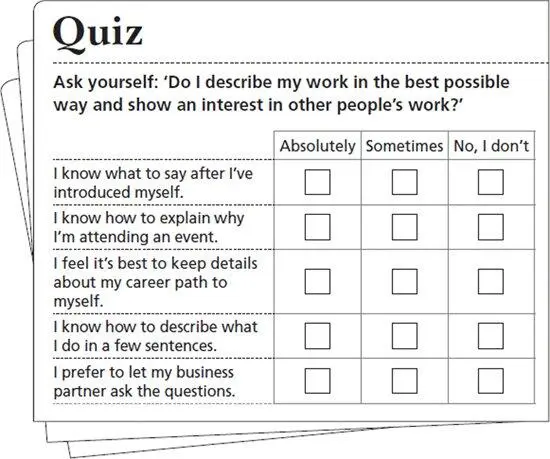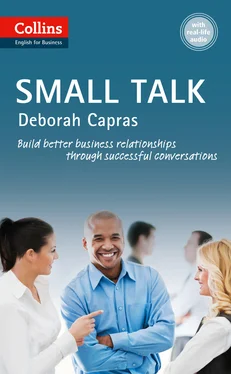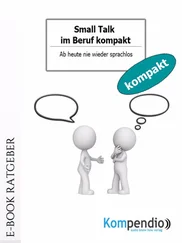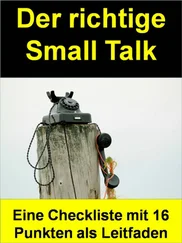.............................................................................
Frank:Yes! It’s much, much better than last year.
Language focus: Tag questions
Tag questions are very useful when you want to strike up a conversation. We use them if we expect someone to agree with what we are saying. They make the listener feel like they have something in common with the speaker. They are easy to respond to and can lead to longer conversations.
We make tag questions by adding question tags to statements. If the statement has a positive verb, we use a negative question tag. Here are some common tag questions that can be used to strike up a conversation.
The food here is great, isn’t it?
(It’s a) great venue, isn’t it?
(It was an) interesting programme, wasn’t it?
(This is an) amazing place, isn’t it?
Horrible/Lovely weather, isn’t it?
(It’s) busy, isn’t it?
In small talk try to respond in a positive way whenever possible. It is best to answer with more than just ‘Yes, it is’. Try to make a further comment so that the conversation can flow more easily.
A: Horrible weather, isn’t it?
B: Yes, it’s much worse than I expected.
A: Interesting programme, isn’t it?
B: Very. There are so many talks I’d like to go to.
A: Long line, isn’t it?
B: Yes. The coffee must be good!
If the statement has a negative verb, we use a positive question tag.
A: It isn’t very busy, is it?
B: No, it isn’t. I expected more people to be here.
Remember this! Body language
How can you be successful at starting a conversation with someone you don’t know? Pay attention to people’s body language before you start talking to them. Are they smiling? Are they looking around the room? Are they making eye contact with you? If the answer is ‘yes’, they may be easy to talk to. On the other hand, if they are looking down at their feet or standing alone, apart from other people, they may be more difficult to talk to. Remember, people may be asking the same questions about you. If you have the right body language, people will come up and talk to you too.
Language focus: Conferences
Here are some basic terms to talk about conferences and trade fairs.
● attend (a presentation): This is the first time I’ve attended a workshop on social media.
● cloakroom/restroom: Do you know where the cloakroom is? I’d like to leave my bag there.
● delegate: This is my first time here as a delegate.
● elevator/lift: I hope there’s a lift. The next talk is on the fourth floor.
● exhibit hall: I’m looking for the exhibit hall. Is it down this way?
● exhibitor: We might register as exhibitors next year.
● keynote speaker: The keynote speaker was impressive, wasn’t she?
● main auditorium: Is this the way to the main auditorium?
● panellist: The panellists are clearly experts on computer viruses.
● presenter: I thought the presenter made some useful points.
● session: The last session is usually the most interesting one.
● site plan: Can I have a quick look at your site plan? I’m looking for the information desk.
● venue: This is a fantastic venue.
Next steps
Be prepared for a conference or event. You will need to make preparations anyway, but try to think about how you can use these preparations to improve your small talk at the event. Before you go:
● find out what the weather will be like so that you can think about the kind of tag questions you could use to start a conversation.
● look up the names of the speakers. Conference programmes often have photographs of the speakers too. You might see these people during the break and have a chance to use the key phrase ‘I think I recognize you from the programme’.
● go online and check out the venue. Is there anything special about the building? Did a famous architect design it, for example? Was it used for something else before it was turned into a conference venue? Does it have an interesting history? Is there something interesting about it that you could discuss?
● You may not have time to travel around the city where the conference is taking place, but you might have time to talk about the city with people who know it well. Find out about one or two important places or events before you go so that you can discuss them if you have the chance.
● Make sure you can describe how you travelled to the event. People often like to compare their journeys or their experiences, especially if the conference is somewhere that is difficult to reach.
If you feel prepared, you will feel – and look – more confident when you strike up a conversation.
 Go to www.collinselt.com/businessresourcesto listen to the real-life audio for this chapter.
Go to www.collinselt.com/businessresourcesto listen to the real-life audio for this chapter.
4 Introducing the business

My goals
• Describe my work briefly and in an interesting way
• Show an interest in others
• Find something in common with others

Study focus
Once you have struck up a conversation with someone, you can move on to talk about work. When they first meet someone, people generally describe their work briefly so that everyone has a chance to talk and learn something about each other. The important thing is to listen for something that you have in common with the person you are talking to and, if possible, to make a comment about it.
Key phrases
Finding a business connection
I see from your name tag that you work for Miles Inc.
Do you work for ABC? / Are you based nearby?
So, what do you hope to get out of this conference?
So, what brings you to this talk?
Showing interest in someone’s work
What line of business are you in?
What (exactly) do you do?
How long have you been working for ABC?
Talking about your career
Well, I’m in finance/marketing/banking/retail.
I’ve been there for four years now. / I’ve been working there since January.
I joined them a year ago. Before that I was with Barks.
I used to work in Russia/sales.
I’m self-employed. / I’m a freelancer.
I’m responsible for/I’m in charge of our website.
I run our online marketing.
Describing your goals for the event
I’m looking for new programmers/suppliers.
I’m here to talk to clients/licensees.
I’m looking into/I’m interested in the latest trends/ copyright issues.
Showing interest and talking about a connection
Really? / That’s interesting. / That must be interesting.
Maybe you know … / Maybe you’ve heard of …
Читать дальше

 Go to www.collinselt.com/businessresourcesto listen to the real-life audio for this chapter.
Go to www.collinselt.com/businessresourcesto listen to the real-life audio for this chapter.












